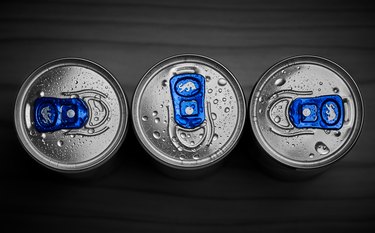
When your energy levels are lacking, it's common to think beyond coffee and consider reaching for a can of Monster Energy caffeine for an extra boost. But have you ever considered the caffeine in Monster versus coffee? Now's the time.
Tip
There are 80 milligrams of caffeine per 8-ounce serving of Monster Energy, or 160 grams per 16-ounce can.
Video of the Day
Monster Energy Caffeine Content
According to Monster Energy's website, a can of classic Monster contains 80 milligrams of caffeine per serving, which equates to 160 milligrams per 16-ounce can. If you prefer to drink less caffeine, opt for a can of Monster Energy Zero Ultra or Monster Energy Absolutely Zero, as both of these have 20 less milligrams of caffeine per can. On the converse, if you crave more caffeine, a can of Monster Mean Bean Java Monster has 188 milligrams of caffeine per can.
Video of the Day
If you're a caffeine addict who can't imagine life without Monster, remember that, according to Mayo Clinic staff, up to 400 milligrams of caffeine per day is typically considered to be safe for most healthy adults. Given that the amount of caffeine in Monster Energy accounts for nearly half of this amount, it's important to remember that some foods naturally have caffeine in them.
According to the USDA, a 1-ounce serving of dark chocolate has roughly 12 milligrams of caffeine. If you're going to consume energy drinks, remember to monitor other sources of caffeine you consume on a daily basis as well.
Read More: 5 Unexpected Benefits of Drinking Matcha Tea
Overall Monster Energy Nutritional Content
At first glance, Monster Energy might not look too horribly unhealthy, but upon closer look, you'll notice that the label is for 8 ounces, which is only half of an entire can. Considering most consumers drink a full can when they buy a canned beverage, this can be misleading. That's why, while Monster caffeine content is typically what's most discussed surrounding the energy drink, it's also a good idea to look at the overall nutritional content.
In addition to the high caffeine content, a 16-ounce can of Monster Energy has 54 carbohydrates, all 54 of which are from added sugars. According to the 2015-2020 Dietary Guidelines for Americans, adults ages 19 and older should be consuming no more than 130 grams of carbohydrates a day to maintain optimal health.
What's more, according to the American Health Association, adult women should eat no more than 100 calories of sugar per day (or 25 grams of sugar) and men should eat no more than 150 (or 38 grams). Given just one can of Monster Energy has more than one-third of the amount of overall carbs, as well as double the sugar recommendation for women, it might make you want to re-think your beverage of choice.
Additionally, one 16-ounce can contains 200 percent of your daily vitamin B6 recommendations. Like most nutritional supplements, the amount of B6 you need depends on your age. According to the National Institutes of Health Office of Dietary Supplements, adults 19 years and older need between 1.3 and 1.5 milligrams of vitamin B6 per day, with pregnant teens and women needing around 2 milligrams per day.
According to the National Institutes of Health Office of Dietary Supplements, consuming between 80 and 100 milligrams of vitamin B6 per day for longer than a year can result in severe nerve damage, skin discomfort, and more. Granted, this would require drinking upwards of 10 Monster Energy drinks a day, but it's still worthwhile to keep in mind in case you also take vitamin B6 supplements or eat other foods rich in the nutrient.
Monster vs. Red Bull Caffeine
Compared to a 16-ounce Red Bull (220 calories), Monster is comparable. Where Monster (which ranks in at 200 calories per 16-ounce can) has 160 grams of caffeine and 56 grams of carbohydrates (read: sugar) in a 16-ounce can, Red Bull has 160 grams of caffeine and 54 grams of sugar in the same size. In other words, they offer roughly the same energy boost.
Now, compare the caffeine in Monster versus coffee. According to MedLinePlus, an 8-ounce cup of coffee contains between 95 and 200 milligrams of caffeine. The only thing is, unlike energy drinks, coffee (so long as its black) doesn't contain added sugars or carbs. In other words, while energy drinks might give you an energy boost, nutritionally, it's best to stick to a classic cup of joe.
- Monster Energy: "Monster Energy"
- Mayo Clinic: "Caffeine: How Much Is too Much?"
- USDA Food Data Central: "Chocolate, dark, 45- 59% cacao solids"
- Dietary Guidelines for Americans 2015-2020: "Appendix 7. Nutritional Goals for Age-Sex Groups Based on Dietary Reference Intakes and Dietary Guidelines Recommendations"
- American Heart Association: "Added Sugars"
- National Institutes of Health Office of Dietary Supplements: "Vitamin B6"
- Red Bull: "Red Bull Energy Drink Ingredients"
- MedLinePlus: "Caffeine"